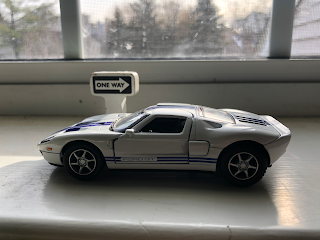What Would Artificial Intelligence Do?
AI would stop the car in the straightest, shortest, possible line. That would be my answer to the trolley problem which asks an autonomous vehicle to chose between hitting a pedestrian or avoiding a pedestrian by veering off a cliff and taking you, the occupant, with it.
In the same vein as "Who would win in a fight, Hulk or Superman?" the trolley problem is entertaining but doesn't produce practical answers. As Jason Hong laments in the link above, "... the problems are framed such that the autonomous vehicle is the only entity with any agency. Or to put it more simply, pedestrians are completely passive and won't try to dodge oncoming vehicles."
In the same vein as "Who would win in a fight, Hulk or Superman?" the trolley problem is entertaining but doesn't produce practical answers. As Jason Hong laments in the link above, "... the problems are framed such that the autonomous vehicle is the only entity with any agency. Or to put it more simply, pedestrians are completely passive and won't try to dodge oncoming vehicles."
Anyone who has done the "hallway dance" would readily agree with Mr. Hong. Indeed, my wife recounted an accident in her youth when she hit a goat with her car, doing precisely this dance.
We should, instead, focus on long-range embedded road sensors to detect wayward pedestrians, and braking systems that can stop a car in ever shorter distances. Failing to avoid an impact, we can find ways to reduce injury such as hoods that gently explode upward to "catch" the pedestrian. We can also install roller guardrails in to save us from going over a cliff. And of course we must continue to build out our infrastructure to support emergency calls, emergency lanes, and emergency medical facilities.
Moving from the driver's seat to the boardroom seat poses a more interesting problem for AI. Various news outlets -- including RealClear Politics and Ars Technica -- have reported that automakers are faced with a choice between California's stricter emissions rules or the Trump administration's more relaxed rules. On the surface, the right answer seems to be that automakers should do the right thing and take the California route: be sensitive to the environment and please the customers. But that's not what's happening. Four automakers -- VW, Ford, BMW, and Honda -- have signed on with California, while eight automakers -- GM, Fiat Chrysler, Toyota, Mazda, Hyundai, Nissan, and Kia -- stand with the White House. Game theory is at play.
Corporations are amoral entities, tasked with making a profit. They don't care about doing the right thing, but they do balance profits with public relations, along with their standing among their competitors.
Supporting California's Standards
VW, still suffering customer outrage from diesel-gate, would do well to support the California standards as penance.
Ford, having stopped producing sedans, is under pressure. They do, however, have EV plans with the Mustang Mach E, and a pickup truck being jointly developed with Rivian. Adopting the California standards would put pressure on their competitors.
BMW's target market is the urban professional. California standards would just make more sense.
Honda is well underway to meeting California standards. Adopting them would give them the moral high ground and put pressure on their competitors.
Supporting the White House's Relaxed Standards
GM, Fiat Chrysler, and Nissan are struggling companies. Adopting relaxed emission standards would give them breathing room.
Hyundai and Kia make good vehicles that are neither gas guzzlers nor super efficient. Abiding by the White House standards would be the safe choice.
Mazda ranks at or near the top in terms of fleet-wide mpg, and as a small company, cannot afford to lose that distinction. If Mazda sided with California, competitors would be pressured to produce more fuel efficient cars sooner, rather than later.
Toyota's mpg fleet average is on a downward trend, and sales of the Prius hybrid have been declining. In addition, Toyota has no EV strategy, and is instead, pursing the hydrogen fuel cell with the Mirai -- a dead end. The joke about the hydrogen fuel cell is that it was, is, and will always be... the future.
What would AI do? 🤔
We should, instead, focus on long-range embedded road sensors to detect wayward pedestrians, and braking systems that can stop a car in ever shorter distances. Failing to avoid an impact, we can find ways to reduce injury such as hoods that gently explode upward to "catch" the pedestrian. We can also install roller guardrails in to save us from going over a cliff. And of course we must continue to build out our infrastructure to support emergency calls, emergency lanes, and emergency medical facilities.
Moving from the driver's seat to the boardroom seat poses a more interesting problem for AI. Various news outlets -- including RealClear Politics and Ars Technica -- have reported that automakers are faced with a choice between California's stricter emissions rules or the Trump administration's more relaxed rules. On the surface, the right answer seems to be that automakers should do the right thing and take the California route: be sensitive to the environment and please the customers. But that's not what's happening. Four automakers -- VW, Ford, BMW, and Honda -- have signed on with California, while eight automakers -- GM, Fiat Chrysler, Toyota, Mazda, Hyundai, Nissan, and Kia -- stand with the White House. Game theory is at play.
Corporations are amoral entities, tasked with making a profit. They don't care about doing the right thing, but they do balance profits with public relations, along with their standing among their competitors.
Supporting California's Standards
VW, still suffering customer outrage from diesel-gate, would do well to support the California standards as penance.
Ford, having stopped producing sedans, is under pressure. They do, however, have EV plans with the Mustang Mach E, and a pickup truck being jointly developed with Rivian. Adopting the California standards would put pressure on their competitors.
BMW's target market is the urban professional. California standards would just make more sense.
Honda is well underway to meeting California standards. Adopting them would give them the moral high ground and put pressure on their competitors.
Supporting the White House's Relaxed Standards
GM, Fiat Chrysler, and Nissan are struggling companies. Adopting relaxed emission standards would give them breathing room.
Hyundai and Kia make good vehicles that are neither gas guzzlers nor super efficient. Abiding by the White House standards would be the safe choice.
Mazda ranks at or near the top in terms of fleet-wide mpg, and as a small company, cannot afford to lose that distinction. If Mazda sided with California, competitors would be pressured to produce more fuel efficient cars sooner, rather than later.
Toyota's mpg fleet average is on a downward trend, and sales of the Prius hybrid have been declining. In addition, Toyota has no EV strategy, and is instead, pursing the hydrogen fuel cell with the Mirai -- a dead end. The joke about the hydrogen fuel cell is that it was, is, and will always be... the future.
What would AI do? 🤔




Comments